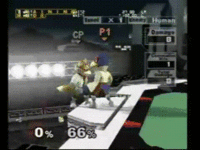Ceiling glitch: Difference between revisions
Serpent King (talk | contribs) m (Protected "Ceiling glitch": Excessive vandalism: Page seems very prone to vandalism for some reason. ([Edit=Allow only autoconfirmed users] (expires 04:10, 31 January 2016 (UTC)) [Move=Allow only autoconfirmed users] (expires 04:10, 31 January 2016 (U) |
m (Removed protection from "Ceiling glitch": needless protection; way too after-the-fact to accomplish anything) |
(No difference)
| |
Revision as of 00:22, December 31, 2015
The ceiling glitch (also invisible ceiling glitch, known as Y-knockback-velocity-cancelling in Japan) is a glitch in Super Smash Bros. Melee that resets the victim's vertical velocity to zero upon activation. Most commonly, this makes a character knocked upward appear to get hit by an invisible ceiling, seemingly being stage spiked downward.
Explanation
When a grounded character's attack hits a shield, the character takes a small amount of recoil force (sometimes known as attacker shield knockback velocity), helping put space between them and the shielding character. Normally, this force dies away quickly due to traction. However, if the character is damaged or somehow leaves the ground before the force completely dissipates, the game may not register that the force has expired. Until the character returns to a grounded state and the game can recognize that the force has ended, they remain under partial influence of it: the character's vertical velocity is set to zero if they get hit by something. As a result, there can be an extended period of time where the character reacts in unusual ways to attacks: purely vertical attacks cause them to stop dead in midair briefly, while attacks with a horizontal component will act as dangerous semi-spikes.
Uses
Shielding player (Player A)
Under normal circumstances, it is difficult for player A to properly recognize and react to the glitch being active on their opponent. Should they successfully notice or guess that it has occurred, however, they can plan to use horizontal or diagonal attacks as effective semi-spikes, making it very difficult for player B to recover before reaching solid ground and fixing the glitch. Should player A wish to try and inflict the glitch on their opponent, they need to act very quickly after their shield is it, requiring a powershield, specific shield SDI, edge-cancelling, or other such technique. Alternatively, a teammate can strike player B if player A cannot react in time.
Attacking player (Player B)
If the attacking player thinks their opponent does not recognize the glitch (or cannot react fast enough to do so), they can intend to strike player A's shield and take an out-of-shield vertical KO move for minimal knockback and much confusion; one prime example is Fox's up smash, which normally has strong KO power but would simply send player B across the stage's surface while the glitch is active. Similarly, if the glitch is active, meteor smashes that have no horizontal component will simply reset player B's velocity to zero instead of dealing knockback, which can cause player A to make the wrong move after the unexpected result. This particular scenario directly resulted in S2J losing a set to Abate at The Big House 5.
Notably, Luigi's extremely low traction allows him to abuse the glitch without needing input from the opponent: if his attack deals enough damage, he can jump before he stops sliding after hitting the shield. Concurrently, Luigi is the easiest character for opponents to inflict the glitch on, though it depends on whether they can reach him.




